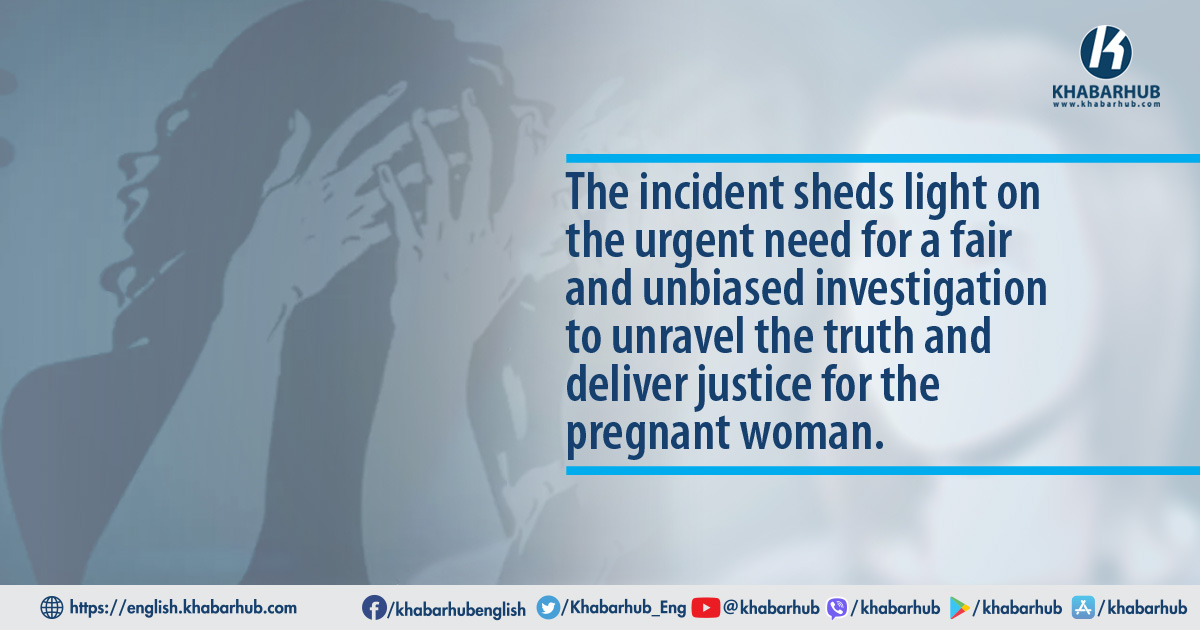KATHMANDU: In a disturbing turn of events, a seven-month pregnant woman who courageously reported a rape incident found herself accused by the police of not settling accounts before filing a complaint.
This alarming situation unfolded in Bajura’s Himali Rural Municipality-3, where the victim’s cry for justice met with disbelief and counteraccusations.
Contrary to established procedures in cases of coercion, where police typically act promptly based on verbal complaints to arrest the accused and ensure the victim’s protection, the pregnant woman in Bajura faced an uphill battle.
Shockingly, the police initially refused to accept her complaint, insisting that the accounts had not been reconciled.
On December 27, 2023, just a day after the traumatic incident, the victim sought help at Bichhya police station.
Despite the seriousness of the situation, the police reportedly dismissed her plea, resorting to an insensitive treatment by throwing salt and sugar on the victim.
It took an additional two days for the distressed woman to reach the district headquarters, where she desperately sought justice.
Only under mounting pressure from rights activists did the police eventually arrest the accused, Jung Singh Budha.
However, the tables turned when, two days later, the police arrested the victim herself.
The ordeal for the pregnant woman continues as she laments having to navigate checkpoints while pregnant and being denied the rest she desperately needs at home.
The father of the accused filed a complaint against the victim’s husband and others, implicating them in the murder industry.
Subsequently, the police arrested four individuals, including the victim’s husband and her brother-in-law, initiating a case against them.
Contrary to the accusations, the victim claims that Jung Singh did not force her; instead, it was her husband who attacked and injured her during the incident.
She asserted that the injuries inflicted with a sickle were in self-defense as she resisted the assault.
“When he forced me, I hit him, he has injuries on his body,” stated the victim, pleading for justice amid the intricate web of accusations.
The incident sheds light on the urgent need for a fair and unbiased investigation to unravel the truth and deliver justice for the pregnant woman.
They allege that the police, despite a verbal complaint, hesitated to promptly arrest the accused, casting doubt on their commitment to justice.
The ordeal for the pregnant woman continues as she laments having to navigate checkpoints while pregnant and being denied the rest she desperately needs at home.
The toll on her health has become evident, with issues arising due to neglecting proper nutrition, compounded by the physical challenges of walking during pregnancy.
To add to her distress, she bemoans the lack of support from those around her.
The victim alleges a concerted effort to silence them, claiming, “There is no one to speak for us. The victim’s family was locked up in jail and threatened to keep them silent.”
Despite the arrest of the accused, a push for comprehensive reconciliation has emerged.
Jiwan Sunar, the victim’s brother-in-law, reveals that despite advice to reconcile, they refuse to do so, asserting, “You cannot forgive what happened to a pregnant woman.”
He insists that even though his brother-in-law suggested sending the perpetrator to jail, reconciliation remains elusive.
Sunar further contends that the accused, Jung Singh, enjoys political protection, being related to an official in the district committee of the main party.
Expressing dissatisfaction with the police response, he accuses them of being insensitive to the gravity of the rape incident.
Rights activists echo this sentiment, condemning the police for not prioritizing a sensitive investigation into heinous crimes like rape.
“People’s representatives do not shield perpetrators of extortion,” asserts Rajkala Sarki, the Vice President of Himali Rural Municipality, dispelling claims that they endorse forced labor cases.
Police Inspector Kishore Singh Airi, the Information Officer of District Police Office Bajura, acknowledges that the woman’s health has been examined, and they await the report.
He maintains that the examination results will guide their course of action, emphasizing the need for thorough consideration.
However, questions arise about potential bias within the police force.
When queried about the delay in arresting the accused, police inspector Singh attributes it to the victim’s lack of clarity about the rape incident.
He asserts that they acted promptly upon receiving the complaint, arresting the accused on the same day and initiating an investigation.
In a surprising twist, the victims’ families accuse the police and Dalit rights activists of siding with the perpetrator.
They allege that the police, despite a verbal complaint, hesitated to promptly arrest the accused, casting doubt on their commitment to justice.
Moreover, they claim that various organizations in the district advocating for Dalit rights prioritize other crimes over the one, fueling suspicions of partiality in the pursuit of justice.
The unfolding situation demands a fair and unbiased investigation to ensure justice for the pregnant woman and to address concerns of systemic bias.
The investigation aims to uncover the truth behind the incident, with a focus on delivering justice without interference from political or community influences.
“People’s representatives do not shield perpetrators of extortion,” asserts Rajkala Sarki, the Vice President of Himali Rural Municipality, dispelling claims that they endorse forced labor cases.
Speaking to Khabarhub, Sarki emphasized that she did not advocate for reconciliation in heinous crimes like rape.
Sarki explained, “The victim’s house and the accused’s residence are close to each other. Fearing potential trouble, neighbors suggested a meeting.”
However, she vehemently denies the allegation that people’s representatives initiated reconciliation, asserting that the media misreported to encourage reconciliation.
Sarki urges accurate reporting based on the actual facts of the case.
She assured that the truth is under investigation and emphasized a commitment to ensuring no loopholes in punishing the guilty.
Sarki stated, “There is no political bias. If he is guilty, he will be punished.”
Addressing the jurisdiction, Sarki clarified that the judicial committee does not handle crimes related to rape; such matters fall within the court’s purview.
Consequently, she refutes any possibility of people’s representatives protecting the accused.
The incident in question involves a 30-year-old woman who alleges that a local 25-year-old, Jung Singh Budha, raped her at 1 am.
That night, her husband was away in the village for local event.
Upon his late return, she had closed the door and was asleep. She awoke in the middle of the night to someone assaulting her.
According to the victim, the assailant tried to forcibly rape her, pressing on her pregnant belly.
The legal standpoint underscores the gravity of crimes like attempt to rape and discourages attempts at reconciliation, advocating instead for a thorough and unbiased legal process.
In an attempt to defend herself, she struck the man with pliers, causing injuries to his head and other body parts.
The assailant withdrew, and the woman raised an alarm, prompting him to flee the scene.
The investigation aims to uncover the truth behind the incident, with a focus on delivering justice without interference from political or community influences.
After the victim raised an alarm, neighbors quickly gathered, and she informed her husband.
Jung Singh’s residence is located at some distance from the victim’s house, leading to a confrontation between the victim’s husband, brother-in-law, and Jung Singh.
A scuffle ensued involving Jung Singh’s brother, Bam Bahadur Budha, over the incident.
Legal Perspective:
Advocate Radhika Khatiwada emphasizes that reconciliation should not be pursued in heinous crimes, as it could perpetuate such actions in society, stating, “Reconciliation in crimes is tantamount to endorsing criminal behavior.”
Referring to Article 227 of the Civil Code, section (a), Khatiwada points out that reconciliation is deemed a criminal act.
Offenders may face imprisonment for up to 3 years. She adds that government employees and individuals holding positions of responsibility in the state could be subject to an additional 6 months of imprisonment in their case.
The legal standpoint underscores the gravity of crimes like rape and discourages attempts at reconciliation, advocating instead for a thorough and unbiased legal process.









Comment